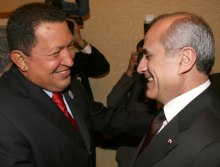 President Hugo Chavez severed Venezuela’s diplomatic relations with Colombia on Thursday over claims he harbors guerrillas, and he warned that his neighbor’s leader could attempt to provoke a war.
President Hugo Chavez severed Venezuela’s diplomatic relations with Colombia on Thursday over claims he harbors guerrillas, and he warned that his neighbor’s leader could attempt to provoke a war.
Chavez said he was forced to break off all relations because Colombian officials claim he has failed to act against leftist rebels who allegedly have taken shelter in Venezuelan territory.
He acted moments after Colombian Ambassador Luis Alfonso Hoyos presented a meeting of the Organization of American States in Washington with photos, videos, witness testimony and maps of what he said were rebel camps inside Venezuela and challenged Venezuelan officials to let independent observers visit them.
Neither Chavez nor his OAS ambassador directly responded to the Colombian challenge to let people visit the alleged site of the camps.
In Washington, Hoyos said that roughly 1,500 rebels are currency hiding out in Venezuela and he showed follow diplomats numerous aerial photographs of what he identified as rebel camps located within Venezuelan territory.
Hoyos said that Uribe’s government has repeatedly asked for Venezuela’s cooperation to prevent guerrillas from slipping over the porous 1,400-mile (2,300-kilometer) border that separates the two countries.
“We have the right to demand that Venezuela doesn’t hide those wanted by Colombia,” Hoyos said, urging the OAS to investigate Colombia’s claims.
He insisted that several rebel leaders are currently hiding out in Venezuela.
Venezuelan Foreign Minister Nicolas Maduro announced that Chavez’s government has closed its embassy in Bogota and demanded that Colombia’s ambassador in Caracas leave the country within 72 hours.
Maduro accused Colombia of provoking Venezuela, saying Uribe forced Chavez’s hand because he blatantly lied about the rebel presence in Venezuela.
Uribe “has put political and economic relations into a hole,” he said.
Venezuela is considering other possible measures to protest “Colombia’s aggressions against our country,” Maduro told state television without elaborating. He hinted that the military might take steps to guarantee the sovereignty of Venezuela’s airspace.
Chavez’s envoy to the OAS, Roy Chaderton, said the photographs that Hoyos showed fellow diplomats don’t provide any solid evidence of a guerrilla presence in Venezuela.
Chavez suggested the photographs could be bogus, saying Uribe “is capable of anything.”
The socialist leader has argued in the past that U.S. officials are using Colombia as part of a broader plan to portray him as a supporter of terrorist groups to provide justification for U.S. military intervention in Venezuela.
Chavez, who appeared alongside Argentine football star Diego Maradona, said the United States is using Colombia to undermine Venezuela’s efforts toward regional integration, and expressed doubts that Colombia’s president-elect, Juan Manuel Santos, will stray from Uribe’s U.S.-backed military policies.
“Hopefully he’ll understand that leftist and right-wing governments can live together,” Chavez said of Santos.
Chavez insisted that Venezuela is doing everything possible to prevent members of the Revolutionary Armed Forces of Colombia and the smaller National Liberation Army from crossing into Venezuelan territory.
“We pursue them,” he said.
Venezuela’s opposition echoed Colombia’s accusations.
“We have a government that shelters and protects Colombian guerrillas,” said Luis Carlos Solorzano of the Copei opposition party.
Solorzano said that rebels have taken shelter in the states of Zulia, Tachira, Barinas, Portuguesa, Cojedes, Aragua and Apure, leaving behind their camouflage fatigues and hiding out in sparsely populated rural areas. The military and other state security forces don’t bother the guerrillas, he added. AP
Photo: In this file photo Venezuelan President Hugo Chavez (L) is shown here with Lebanese president Michel Suleiman during their meting at the UN

Leave a Reply
You must be logged in to post a comment.